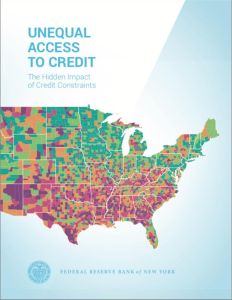Join getAbstract to access the summary!

Join getAbstract to access the summary!
Kausar Hamdani, Claire Kramer Mills, Edison Reyes and Jessica Battisto
Unequal Access to Credit
The Hidden Impact of Credit Constraints
Federal Reserve Bank of New York, 2019
What's inside?
Access to credit enables economic security for individuals and financial resilience for communities.
Recommendation
Access to credit lets people take advantage of opportunities and helps ensure their financial security. But many individuals face barriers to obtaining credit, and that has a knock-on effect on their communities’ economic stability. Analysts at the Federal Reserve Bank of New York have designed a “Credit Insecurity Index” to provide a more accurate picture of a neighborhood’s financial well-being. Financial professionals and community leaders will find the index a useful tool in assessing an area’s financial health.
Summary
About the Authors
Kausar Hamdani, Claire Kramer Mills, Edison Reyes and Jessica Battisto are analysts at the Federal Reserve Bank of New York.

















Comment on this summary